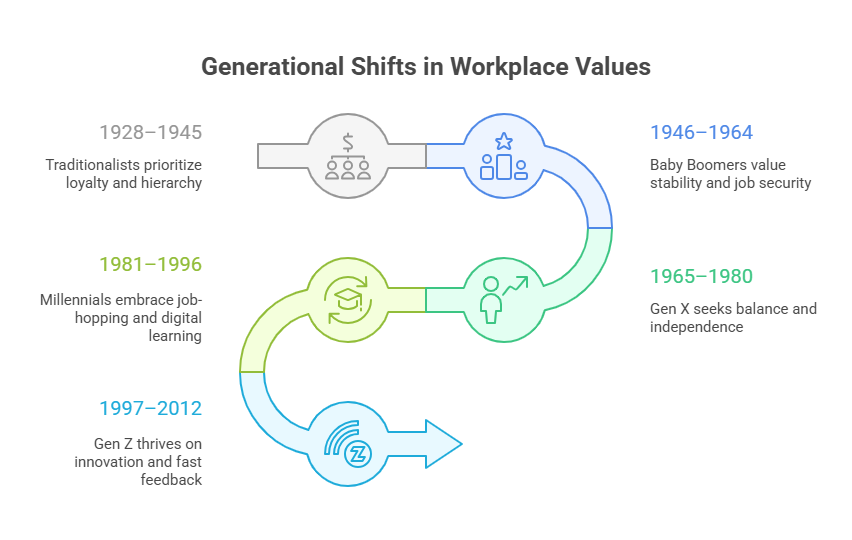Climbing the Ladder: Generational Approaches to Career Success
Career success doesn’t follow a single blueprint—and it never has. Each generation in the workforce has navigated its own unique path, influenced by the economic conditions, cultural values, and technological shifts of its time.
Understanding how Traditionalists, Baby Boomers, Generation X, Millennials, and Generation Z approach career growth can offer powerful insights for today’s leaders. It’s not just about appreciating history—it’s about fostering work environments that are inclusive, adaptive, and equipped for multigenerational success.
Traditionalists (1928–1945): Discipline and Hierarchy
Shaped by the Great Depression and World War II, Traditionalists valued hard work, loyalty, and clearly defined structures. Career success meant staying with one employer for decades, rising steadily through the ranks by proving dedication and following the rules.
Key Strategies: Long-term loyalty, respect for authority, formal training through military or vocational education.
Impact: Traditionalists built the foundation of modern corporate culture—favoring stability, seniority, and structured progression.
Baby Boomers (1946–1964): Stability and Loyalty
Boomers entered a booming economy where the American Dream felt attainable. They brought a strong work ethic, a commitment to tenure, and a belief in climbing the traditional corporate ladder.
Key Strategies: Job security, seniority-based promotions, formal education as a stepping stone to advancement.
Impact: Their influence solidified the “career ladder” model and benefits like pensions and long-term employment packages.
Generation X (1965–1980): Balance and Pragmatism
Gen X watched their parents face layoffs and economic uncertainty. As a result, they approached work more independently—valuing flexibility, transferable skills, and a healthy work-life balance.
Key Strategies: Diversified skill sets, career mobility, prioritization of personal fulfillment alongside professional goals.
Impact: Gen X catalyzed the rise of remote work, professional development programs, and a shift toward employee autonomy.
Millennials (1981–1996): Purpose-Driven and Adaptive
Millennials entered the workforce during recession and rapid tech disruption. They sought more than a paycheck—they wanted meaning, purpose, and flexibility.
Key Strategies: Job hopping for growth, alignment with personal values, tech-savvy networking and continuous learning.
Impact: Millennials transformed workplace culture—demanding transparency, social impact, and flexible, people-centered policies.
Generation Z (1997–2012): Digital-First and Entrepreneurial
Gen Z is the first true digital-native generation. They’re bold, entrepreneurial, and driven by fast feedback and continuous innovation.
Key Strategies: Self-employment, side hustles, rapid upskilling, and a drive for immediate impact.
Impact: Gen Z is reshaping the modern workforce—blurring the lines between employee and entrepreneur, digital and physical, local and global.
What Does This Mean for Today’s Workplace?
Understanding these generational approaches to career success isn’t just interesting—it’s essential. Leaders who honor the diverse values, experiences, and aspirations of each generation are better equipped to create environments where everyone can thrive.
From stability to adaptability, from loyalty to innovation—each generation offers something valuable. The future of work depends on our ability to integrate those strengths.
Want to explore more about generational dynamics at work? Connect with us at Katherine Jeffery Consulting to learn how we help organizations lead across generations.
#GenerationalLeadership #CareerDevelopment #MultigenerationalWorkplace #FutureOfWork
